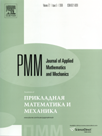 | | Journal of Applied
Mathematics and Mechanics
Russian Academy of Sciences | | Founded
in January 1936
(Translated from 1958)
Issued 6 times a year
ISSN 0021-8928
(print version) |
Archive of Issues
| Total articles in the database: | | 10610 |
| In Russian (ΟΜΜ): | | 9811
|
| In English (J. Appl. Math. Mech.): | | 799 |
|
| << Previous article | Volume 75, Issue 5 / 2011 | Next article >> |
| A.N. Kraiko, "Shock wave structure in an inviscid heat-conducting locally equilibrium medium of a perfect gas with radiation," J. Appl. Math. Mech. 75 (5), 539-552 (2011) |
| Year |
2011 |
Volume |
75 |
Issue |
5 |
Pages |
539-552 |
| Title |
Shock wave structure in an inviscid heat-conducting locally equilibrium medium of a perfect gas with radiation |
| Author(s) |
A.N. Kraiko (Moscow, Russia, akraiko@ciam.ru) |
| Abstract |
The structure of a shock wave (SW) in an inviscid heat-conducting locally equilibrium medium of a perfect gas with radiation at temperatures up to hundreds of thousands and millions of degrees is analysed in the approximation of non-linear heat conduction. At such temperatures, heat conduction is far more important than viscosity, the medium consists of ions, electrons and radiation, and the electrons and radiation make a decisive contribution to the heat transfer and an appreciable contribution to the thermodynamic functions of the medium. Combinations with the dimensions of all the flow parameters are constructed from the gas density ahead of the SW and the constants appearing in the equations of state of such a medium. If they are taken as the corresponding scales, the equations of state for different media in dimensionless form only differ in the ratio of the specific heat capacities (the adiabatic exponent) of the gas. The SW structure is studied for adiabatic exponents from 1 to 3, dimensionless temperatures ahead of the SW from zero to infinity and any SW velocities exceeding the speed of sound in the unperturbed medium. The following cases are successively considered: 1) when the contribution due to radiation is neglected in the equations of state, 2) when radiation is taken into account and the SW moves through a gas at a zero temperature (through a cold background), and 3) the radiation contribution is allowed for in the case of a warm background. It is ascertained when the SW structure is continuous and when it contains a finite or infinite forerunner and an isothermal shock. The transition from a continuous structure to a structure with an isothermal shock and the intensity of this shock are independent of the form of the formulae for the thermal conductivity in Fourier's law. In the case of adiabatic exponents greater than unity, the structure is continuous for all SW velocities starting from a certain dimensionless background temperature. |
| Received |
21 October 2009 |
| Link to Fulltext |
|
| << Previous article | Volume 75, Issue 5 / 2011 | Next article >> |
|
 If you find a misprint on a webpage, please help us correct it promptly - just highlight and press Ctrl+Enter If you find a misprint on a webpage, please help us correct it promptly - just highlight and press Ctrl+Enter
|
|

 Russian
Russian  English
English